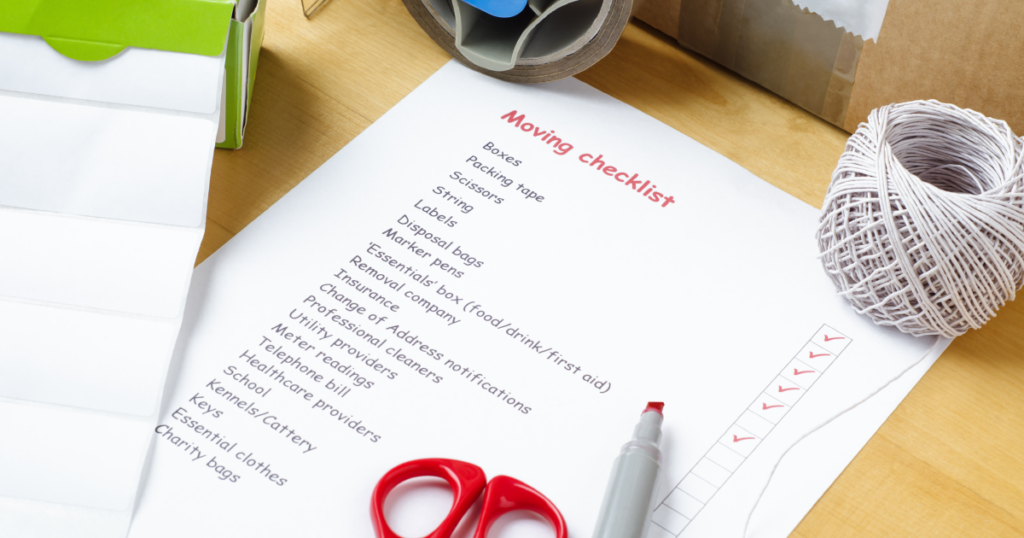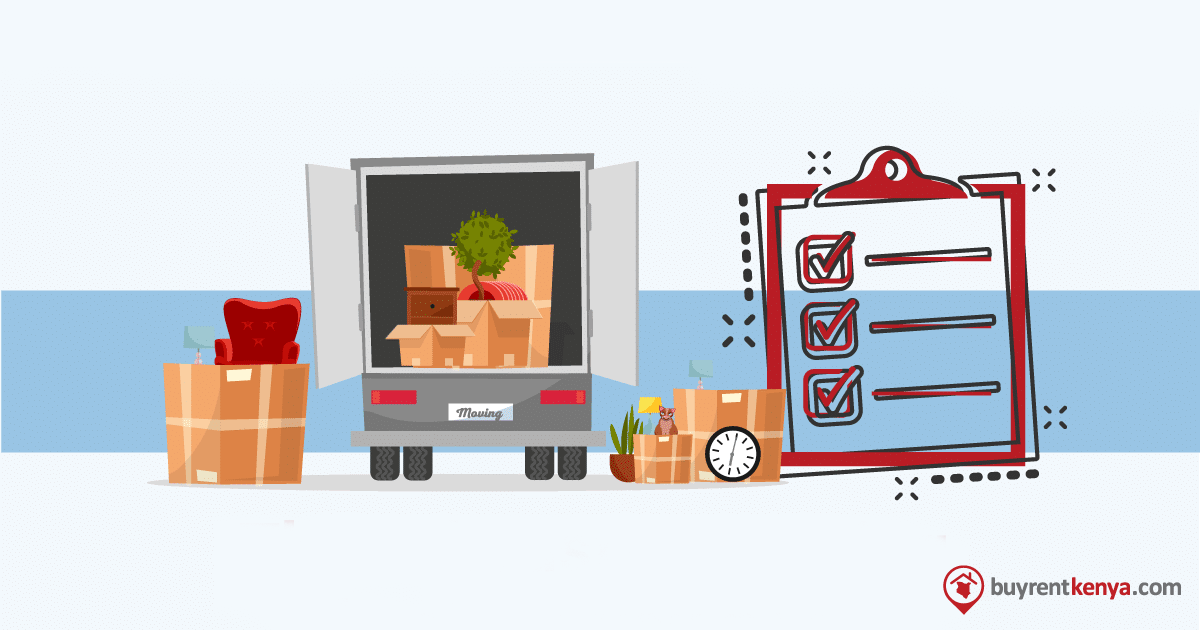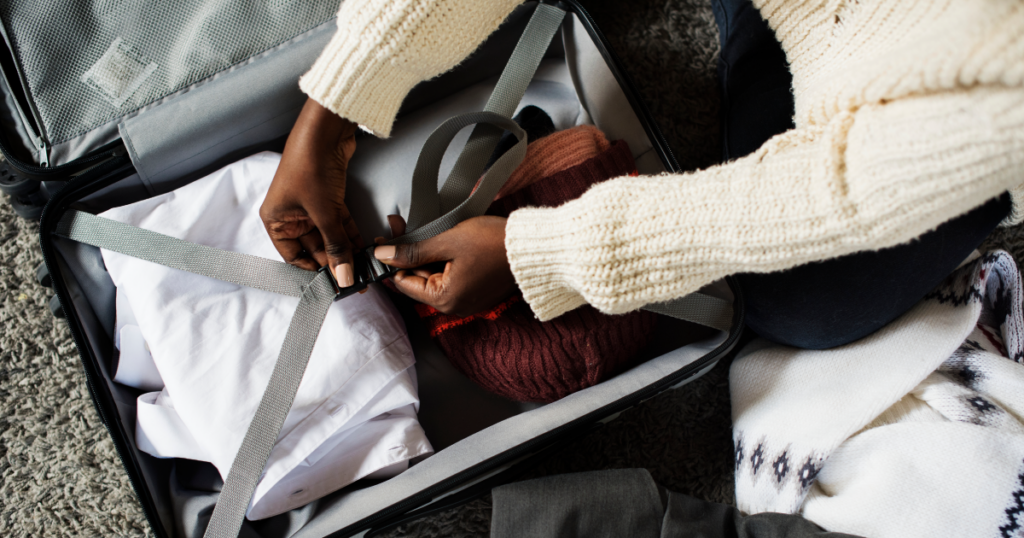Cheers to finding the right home for you and your family! Now onto the moving part, which is usually less fun and could potentially be stressful.
Hiring quality movers is a good way to reduce some of the stress attached to moving. However, there are still some tasks that you need to take care of.
The list of items on your “to-do” list can be overwhelming. However, with the right planning and preparation, you will get through this with a sane mind and enjoy your new home.
Our checklist helps breaks down the major tasks into smaller, more manageable chunks in the following timelines:
- Eight weeks before
- Seven weeks before
- Six weeks before
- Five weeks before
- Four weeks before
- Three weeks before
- Two weeks before
- One week before
- On the moving day
- During the first month after moving
Table of Contents
Eight Weeks Before
Research moving services: Are you hiring movers? If so, do your research and call at least three companies to get their quotation. Keep a keen eye on online reviews, as this can help you spot an excellent one from a good one.
Work out your budget: Whether you are moving by yourself or hiring movers, figure out how much money you need to set aside. Movers in Nairobi will charge between Kshs 10,000-30,000 depending on your belongings and distance.
You also need to budget for other moving add-ons like purchasing of liability coverage in case your valuable items are destroyed when moving.
Otherwise, if moving by yourself, consider the cost of hiring transportation, which will depend on the type of car that fits your needs. This will cost you from Kshs 5,000.
Remember to include the cost of buying moving supplies like bubble wrap, cardboard boxes and packing paper from your local supermarket.
Note down questions to ask your movers: Have a list of questions to ask your movers about licensing, cancellation policies and liability coverage in case something breaks in transit. You need to have a clear picture before assessing and picking one company from the other.
Notify your current landlord: Are you moving from a rental place? If so, this is the right time to give your landlord a heads up. Most leases have a thirty-day notice period, but it doesn’t hurt to do this earlier, your landlord will appreciate the extra time to get a new tenant.
It’s also crucial to counter check with your lease agreement and go over details of what your obligations are before moving out. And seek clarity incase of any obscurity in the contract.
Seven Weeks Before
Get professional estimates: Further engage the three companies picked out during your research. Preferably ask them to do an in-person visit of your belongings or a video survey of what is in each room to give a correct estimate. You don’t want to be paying extra after the move.
Confirm with the movers whether the cost is likely to increase if the actual weight of your belongings differs from the estimate. Always have 20% more in your budget to cater to such a situation.
Ask friends to help with the move: If moving without the help of movers, ask your family members and friends in advance. This will help them plan out /block the day, and you will be more likely to find people as opposed to a last-minute rush.
Book a rental truck: Decided to take the DIY route? Look for available trucks and book one in advance to help with your moving.
Six Weeks Before
Confirm movers: When picking a moving date, bear in mind that the day of the week and time will affect the cost of your move. If you are on a tight budget, think about moving during the week instead of on the weekend.
As much as you are trying to cut on costs, you need to consider the matter of convenience. Moving during the week means you have to take a day off. If you have kids, you need to arrange how to drop and pick them kids so that they don’t miss any school work.
Moving during the week also limits the number of people who might be available to help.
Buy moving supplies: Time to get boxes, bubble wraps, markers and packing paper from your local supermarket. These will help ensure that all your belongings get to your new home in one piece. Know what to use for the fragile vs non-fragile items.
Notify your home insurer: Do you have home insurance? You need to notify your home insurer of change of location, as this could change your premium payments, e.g. if you move to a gated community with better security, you are in a position to negotiate for lower premiums.
If you don’t have cover, here’s a helpful article on why you need to consider insuring your new home.
Five Weeks Before
Use refrigerated and pantry food: Start to use up food in your fridge and storage area to clear out. You can also donate other non-perishables to a children’s home near you or street families. This means that you will have less to pack and carry to your new home.
Plan out your packing: Set out clear timelines for your packing schedule. Arrange to pack up all non-essentials first, things you won’t need in the next month or two, e.g. books, then essentials last. For example, clothing, cutlery and crockery, which are items you are likely to use until the last minute before the move.
Give /sell possessions: The fewer things you move with, the better for you. Consider decluttering by selling some of the possessions you will not need on a site like Pigiame. These could be old but in right state furniture, electronics and clothing items. You will earn some extra shillings to help with the move.
Remember you don’t have to exchange your stuff for money, a rewarding experience is to give away donations to less fortunate families. You can pick a home to donate to from this directory of children’s services.
Confirm notice with the current landlord: Make a follow up with your landlord to confirm the notice to move has been received on time.
Four Weeks Before
Begin packing: Start packing as planned out in your week five schedule, i.e. non-essentials to essentials. Ensure that you take extra care of the fragile items like glasses and clearly label the boxes by room and content. e.g. “Bedroom-shoes”. Use different coloured stickers or pens for the boxes for each room. This will give you an easy time when unpacking, as you can easily place what goes where.
Additionally, keep all valuables and essential documents separately, e.g. have a folder of your school leaving certificates.
Request time off work: Moving on a weekday? Ask for a day off from your employer to facilitate the move. If unable, try to reschedule the move to a weekend. Otherwise, you can arrange for a friend or family to meet you, movers, at the new home.
Confirm times and dates with moving company: If using a moving company, this is the right time to call the moving company and ensure all the dates and times are aligned. Give the movers useful information like availability or lack of lifts.
Notify friends and family: Do people in your inner circle know about your move? If not, this is the right to tell them. You can either do it via email, a phone call or text messages, whichever is more comfortable and depending on your relationship. For those who live close by you, a quick last neighbourhood catch up isn’t such a bad idea.
Three Weeks Before
Alert utility and service providers: If you use gardeners or a security company, notify them of your impending move. You can also look into replacement services of the same in the new neighbourhood.
Call your internet service providers and notify them of the move and arrange the possibility of getting a new router fixed in the new home on the moving day. This will ensure that you don’t interrupt your work, especially if you work from home.
Two Weeks Before
Order new furniture and decor pieces: Does your current furniture perfectly fit into the new home? If not, order these so that they are ready for delivery at least during the first month of your move. Look out for furniture offers to cut on costs.
Aside from furniture, you can already start ordering any other decor pieces for your new home. Remember to prioritise. You can buy furniture and other items in stages.
One Week Before
Clean your old home: It’s only right that you do a deep cleaning of your old home for the next tenant/homeowner. This will help you spot areas that need repair and work on them before your landlord comes to inspect the home.
Inspect the old home: Inspect your home together with the landlord if applicable. Discuss any damages that you were not able to fix up during the cleanup. Agree on how this will impact your deposit. If there is a dispute, try to negotiate in person as opposed to over the phone.
Pack essentials: Time to finish up the packing process with your kitchenware and essentials. Label the boxes clearly to avoid losing track of them during the move. Or worse having to replace items just because you can’t figure out where they are.
Clean the new house: To fully enjoy your new home, give it a thorough cleaning before moving in. Dust all the surfaces, vacuum, mop, and get rid of cobwebs. Additionally, scrub showers, bathtubs, toilets and clean drawers. Do this room by room to ensure you take care of every detail.
You also have the option of hiring professional cleaners to do it for you in a day’s work.
Take inventory: Take stock of all your belongings to keep track of what the movers will be transporting. If any item is damaged, take a photo so that you don’t end up seeking compensation for something that’s your fault. Also, keep a close eye on fragile items for insurance purposes and liability cover.
On the Moving Day
Do a final sweep of the house: Check the house room by room one more last time to ensure that you don’t leave anything behind. Look inside kitchen cabinets, bedroom drawers, and all the hidden spaces.
Hand over the keys: Provided that you don’t have plans to come back and pick anything from the house, give the keys to the landlord. If the home was previously yours and you already have completed the transaction, you can hand them over directly to the new owner. Otherwise, hold on to them till everything is finalised.
During the First Month after Moving
Baby-proof the new home: Do you have a baby? It’s crucial to ensure they are safe and sound in your new home within the first week of moving. Get rid of any objects that might be dangerous and set up baby gates. Do not forget to place covers over electrical outlets that are accessible to your little one.
Unpack: This is the other primary stressful task. But don’t be overwhelmed. You don’t have to do it all at once. Use your colour-codes for easier unpacking. Start by unpacking the essentials, e.g. kitchenware that will be needed to make your meals. Go room by room till you finish the rest of the house. You can spread it out over a week or more.
Change the locks: Did you buy an entirely new home? If not, change the locks and key to ensure the security of your new home. You don’t know who has access to the house from the previous tenant/homeowner’s circles.
Follow up on your deposit: If you moved from a rental home, check with your former landlord on the status of your deposit. Ensure they have all the details needed to facilitate the return of your money, e.g. the right bank account details. Here’s a helpful guide on getting your rent deposit back.
Moving to a new home is an exciting chapter in one’s life, offering the promise of fresh beginnings and new opportunities. However, it can also be an incredibly stressful and overwhelming experience. The thought of packing up your belongings, coordinating logistics, and navigating the challenges of the moving process can leave even the most organized individuals feeling burnt out. That’s why we’ve put together this comprehensive checklist of essential tips for a stress-free move.
Whether you’re moving across town or to an entirely new city, this guide will help you stay organized, reduce anxiety, and make your transition to a new home as smooth as possible. From decluttering and packing to hiring professional movers and settling into your new surroundings, we’ll cover all the crucial steps to ensure a seamless transition to your new home.Essential Tips for a Stress-Free House Move
What Should You Do Before a Move?
Before the chaos of packing boxes and coordinating logistics ensues, taking the time to properly prepare for your move will set the foundation for a smoother transition. The pre-move preparation phase is crucial for ensuring that you stay organized and minimize unnecessary stress along the way.
Tips to Help Make Your Move Stressfree
- Declutter and organize belongings: Moving provides an excellent opportunity to declutter and purge belongings that are no longer in use. Take the time to assess each item and consider whether it’s worth bringing to your new home. Donate, sell, or discard items that no longer serve a purpose in your life. Use labeled bins or boxes to keep items organized and easily identifiable.
- Set a realistic timeline for the move: Moving can be time-consuming, so it’s important to create a timeline that allows for proper planning and execution. Consider factors such as the size of your home, the distance of the move, and any specific deadlines you need to meet.
- Break down tasks into manageable steps: Divide your moving tasks into smaller, manageable steps to avoid feeling overwhelmed. Create a to-do list with deadlines for each task. These may include sorting through belongings, packing specific rooms, and scheduling utility transfers.
When it comes to moving to a new home, enlisting the help of professional movers can significantly alleviate the stress and physical demands of the process. Here are some important considerations and steps to take when researching and hiring professional movers:
Why Should You Hire Professional Movers?
- Expertise and experience: Professional movers are well-trained in packing delicate items, navigating tight spaces, and transporting belongings safely.
- Time and energy savings: By entrusting the moving process to professionals, you can focus your time and energy on other important aspects of the move. This may include such as setting up utilities, notifying change of address, or preparing your new home.
- Equipment and resources: Professional movers come equipped with the necessary tools and equipment to handle the move efficiently. They have dollies, ramps, padding, and straps to securely transport furniture and large items. These resources help minimize the risk of damage to your belongings and ensure a smoother moving process.
- Reliability and accountability: Reputable moving companies are committed to providing reliable and accountable services. They understand the importance of punctuality and timely delivery, helping you stick to your moving schedule. Professional movers also take responsibility for any damage or loss that may occur during the move. Offering insurance options to protect your belongings.
Tips for researching and choosing reliable moving companies
- Seek recommendations: Ask friends, family, or colleagues who have recently moved for recommendations. They can help you find reliable moving companies they’ve had positive experiences with.
- Read reviews: Utilize online platforms and review websites to gather feedback and reviews from previous customers. Pay attention to overall ratings, and comments on professionalism, punctuality, and handling of belongings.
- Verify credentials and insurance: Ensure that the moving company you consider has proper licenses and insurance. This helps protect your belongings and provides peace of mind throughout the moving process.
- Request quotes and compare services: Reach out to several moving companies to obtain detailed quotes for your specific needs. Compare prices, services offered, and any additional fees or insurance options provided.
- Ask about additional services: Inquire about additional services that the movers offer, such as packing and unpacking assistance, furniture disassembly and reassembly, or storage options. Assess whether these services align with your needs and budget.
What to do on Moving Day
Moving day has arrived, and it’s time to put your pre-move preparations into action. Managing this day effectively is crucial to ensure a smooth and organized transition from your old home to your new one.
Here are some essential tips for managing moving day:
- Final walkthrough of the old home
Before the movers arrive, conduct a final walkthrough of your old home. Check each room, closet, and storage area to ensure nothing is left behind.
Verify that all utilities are disconnected, windows are closed, and doors are locked. Leave a forwarding address for any mail or packages that may arrive after your departure.
- Coordinate with professional movers or friends/family to help with the move
If you’ve hired professional movers, communicate with them to ensure everyone is on the same page regarding logistics, timelines, and any special instructions.
If friends or family are assisting with the move, provide clear instructions on tasks, roles, and timelines. Assign specific responsibilities to different individuals to maintain an organized moving process.
- Maintain a checklist for inventory ensuring nothing is left behind

Use a checklist or inventory sheet to keep track of all your belongings during the move. This will help you ensure that everything is accounted for when it comes time to unpack.
Cross off items on the checklist as they are loaded onto the moving truck. Double-check each room before leaving your old home to ensure nothing has been overlooked.
- Staying organized during the moving process
Label boxes clearly with the contents and the room they belong to in your new home. This will make unpacking and locating items much easier.Keep important documents, such as contracts, rental agreements, and contact information for the movers in a designated folder or bag.
Have essential items easily accessible, such as toiletries, a change of clothes, basic kitchen supplies, and important medications. This will ensure you have everything you need during the first day or two without having to unpack everything immediately.
Settling Into Your New Home
Congratulations, you’ve made it to your new home! Now it’s time to focus on settling in and transforming your new space into a comfortable and inviting environment. Unpacking and organizing your belongings is a crucial step in making your new house feel like home. Start with essentials that you’ll need immediately, such as bedding, toiletries, and kitchen essentials. This will ensure that you have the basics covered for a comfortable transition. Prioritize unpacking room by room to maintain focus and prevent becoming overwhelmed. Begin with frequently used spaces like the bedroom, kitchen, and bathroom before moving on to less essential areas.
In addition to settling into your new space, take the time to familiarize yourself with the new neighborhood. Explore nearby amenities and services, such as grocery stores, healthcare facilities, restaurants, parks, and other places that are important to you. Getting to know your new neighborhood will help you feel more connected and at ease. Take the initiative to meet your neighbors and involve yourself in local community activities or groups. Introducing yourself and building connections can create a sense of belonging and help you establish a support network in your new environment.
Time To Settle in
It’s been a long and hectic process. Sit back with your family, relax and enjoy your new home. You can continue improving the look and feel of your home by upgrading decor and furniture in phases. Here are some decor ideas to get you started.





